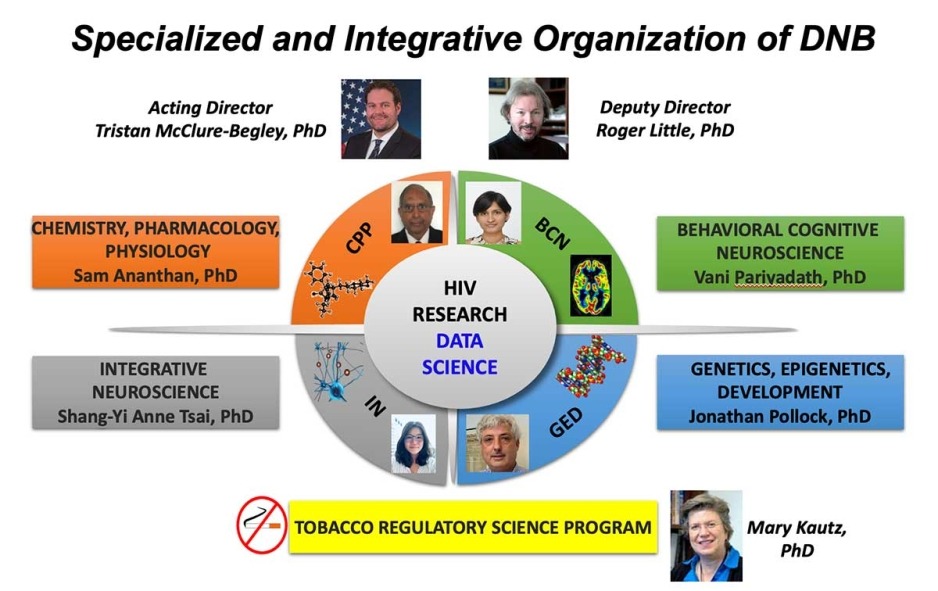What We Do:
The mission of the Division of Neuroscience and Behavior is to discover, facilitate and promote outstanding basic animal and human research towards the mission of NIDA, to identify the causes and consequences of drug use disorders and addiction across the lifespan and to guide treatment strategies. We develop and support an extramural research program that will advance the understanding of the genetic, chemical, neurobiological and behavioral mechanisms of drug use disorders and their long-term consequences. Research related to the neurobiological bases of reward and the behaviors that characterize the cycle of addiction are a primary focus of DNB. Additionally, an integral component of our scientific mission is to grow and maintain a workforce that is dedicated towards our research goals and this is supported through training initiatives that span from predoctoral level to mid-stage investigator.
DNB is organized by four scientific Branches that focus on complementary strategic research areas:
- The Chemistry Pharmacology Branch (CP), directed by Dr. Subramaniam (Sam) Ananthan, is focused on early discovery and validation of targets to treat substance use disorders and adverse effects of addictive drugs. Areas of interest include the structural dynamics of receptors, computational drug design, novel mechanisms of drug delivery.
- The Genetics, Epigenetics and Development Branch (GED), directed by Jonathan Pollock , is focused on genetic determinants of vulnerability to drug use disorders and addiction, effects of addiction on epigenetic and non-coding factors that regulate gene expression and the consequences of exposure to addictive drugs at different windows of development.
- The Behavioral Cognitive Neuroscience Branch (BCN), directed by Vani Pariyadath, is concerned with the behavioral, cognitive and environmental antecedents of exposure to addictive drugs and behavioral, cognitive and environmental approaches for treating drug use disorders, addiction and the adverse consequences of addictive drugs.
- The Integrative Neuroscience Branch (IN), directed by Shang-Yi (Anne) Tsai supports research related to the effects of drug user disorders on neural activity and plasticity from cellular to network levels. Additionally, this branch supports research on the effects on neuroimmune signaling and neuron-glial interactions.
- Dr. Mary Kautz is the DNB lead of the The Tobacco regulatory science program (TRSP)
Certain cross-cutting programs span all four branches including a portfolio in HIV-AIDS research, Data Science Research and research related to sex contributions to individual variability. DNB also encourages studies that leverage tools and technology arising from the BRAIN initiative to address questions relevant to substance use disorders. The DNB In-gagement Group (DIG) works to improve opportunities within DNB and in the initiatives it administers.
DNB encourages applicants to consider the importance of design and reproducibility of their findings, as applicable.
Related Funding Opportunities:
Staff Listings:
Mailing Address:
Division of Neuroscience and Behavior
National Institute on Drug Abuse
C/O NIH Mail Center
NIDA 3WFN MSC 6018
16071 Industrial Drive – Dock 11
Gaithersburg, MD 20892*
*(Use 20892 for U.S. Postal Service, 20877 for UPS and FedEx)
(301) 594-6043 (fax)

